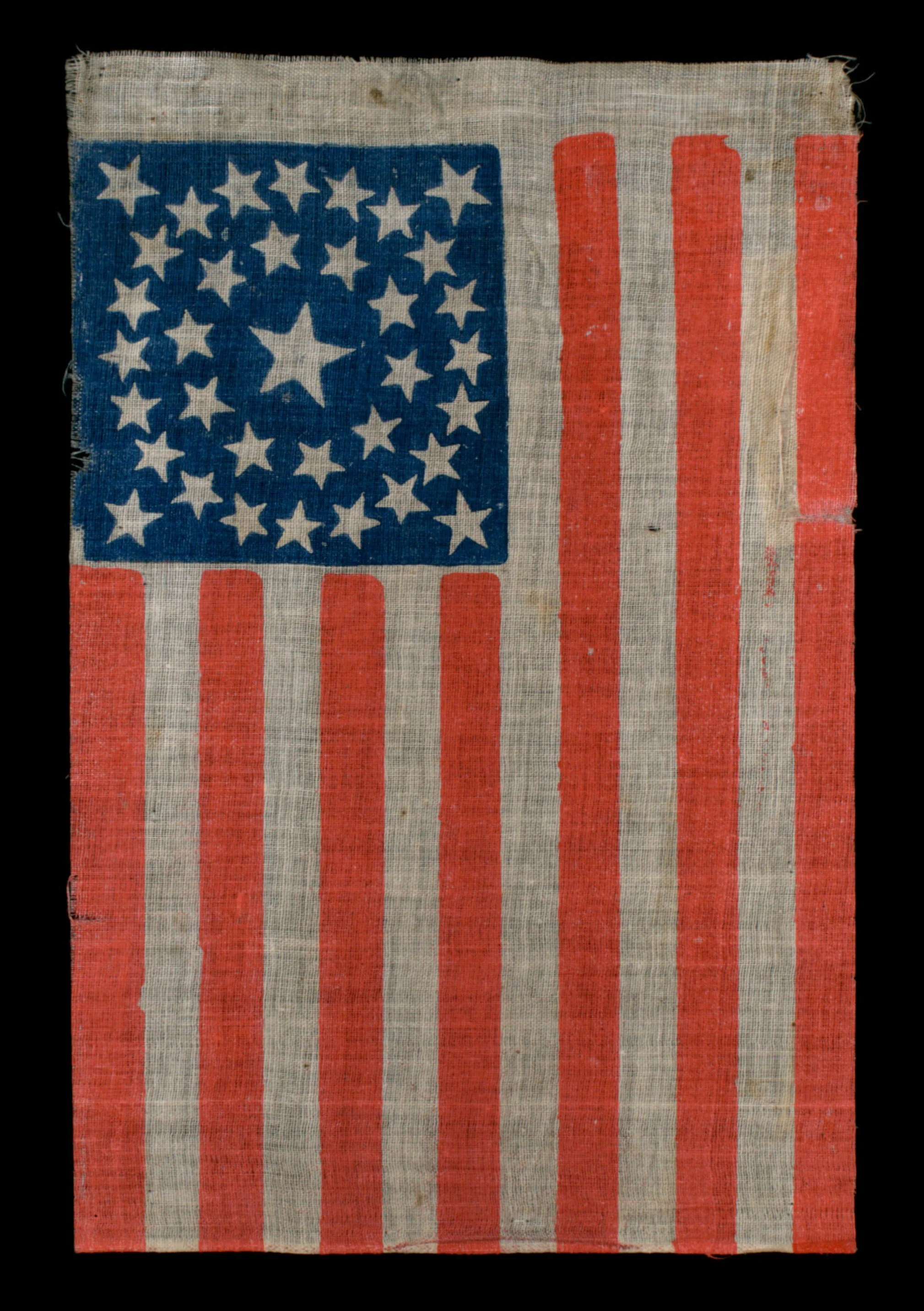Very Rare 35 Star Antique US Flag with a Medallion Configuration | Composed in a Vertical Format | West Virginia Statehood | Circa 1863-1865
Very Rare 35 Star Antique US Flag with a Medallion Configuration | Composed in a Vertical Format | West Virginia Statehood | Circa 1863-1865
Frame Size (H x L): 15” x 12”
Flag Size (H x L): 9.5” x 8.25”
Offered is a thirty-five star American flag printed on glazed cotton, and dating to the height of the Civil War. Its stars are arranged in a wonderful medallion pattern. The large star in the middle is referred to as a “center star,” and it is canted to the 11:00 position. The center star represents the newest state added to the Union (e.g., West Virginia in the case of this thirty-five star flag). Surrounding the center star is a pair of concentric rings of stars, and surrounding the rings are four flanking stars positioned in the corners of the canton.
The stars of this flag are pointed and have a folksy appearance, tightly packed onto the canton. Although the maker of this flag is unknown, these distinctly shaped stars are common to a small family of flags that originated from the same workshop. The maker of this flag made six star counts in this same style: seven, thirteen, fifteen, twenty-nine, thirty-three, and thirty-five. The seven star flags were made to celebrate the first seven states to secede from the Union, while the thirteen star flags were made to celebrate the original thirteen states. The fifteen star flags were made to celebrate Kentucky’s centennial. And the twenty-nine, thirty-three, and thirty-five star flags were made to celebrate the latest states added to the Union (Iowa, Oregon, and West Virginia, respectively). The thirty-five star variation is by far the rarest produced by this maker, and it is estimated that there are ten or fewer in circulation.
The admission of West Virginia as the thirty-fifth state on June 20th, 1863, stands as a unique chapter in American history, symbolizing loyalty to the Union amid the Civil War. Originally part of Virginia, the region that would become West Virginia had long held social and economic differences from the eastern part of the state. With a mountainous terrain unsuitable for plantation-style agriculture, its population relied more on small farming, lumber, and mining rather than slave labor, which created ideological divisions between the east and west. When Virginia seceded from the Union in 1861, representatives from the western counties convened at the Wheeling Conventions to form the Restored Government of Virginia, which remained loyal to the Union and sought separate statehood. Following a process of debate and approval by Congress, which required the inclusion of a gradual emancipation clause in its constitution, West Virginia was admitted as a state during the Civil War—an unprecedented move highlighting the complexities of secession, statehood, and loyalty.
With West Virginia's admission, the U.S. flag gained its thirty-fifth star, which became official on July 4th, 1863. This flag holds the unique distinction of being the only official U.S. flag to represent a state admitted during the Civil War and to gain official status amid the conflict. Because the thirty-five star flag was official for only eighteen months, until July 4th, 1865, when the thirty-six star flag took its place with Nevada’s entry into the Union, it remains one of the rarest U.S. flags from the Civil War era. The brief period of its use, along with the high production of earlier thirty-three and thirty-four star flags before West Virginia’s statehood, limited its circulation, making it especially sought after by collectors.
Today, the thirty-five star flag holds a significant place in U.S. history as a symbol of both the Civil War period and the unique journey of West Virginia’s statehood. Scarcity and historical significance add to its value, as it represents West Virginia's distinct contribution to the Union’s identity during one of America’s most divided eras. The story of the thirty-fifth star and West Virginia's statehood emphasizes the resilience of Union ideals amid internal conflict, reflecting the complex regional identities that influenced national politics and shaped the Union's wartime presence.
Conservation Process: This flag was hand sewn to cotton fabric, and both were hand sewn to a mounting board. To prevent the black dye in the cotton fabric from seeping into the flag, it was first washed in a standard wash and then in a dye setting wash. The flag is positioned behind Optium Museum Acrylic.
Frame: The frame is a striking example of mid-nineteenth century craftsmanship, featuring a rare, hand-painted faux bois design in a warm orange-red tone with subtle black graining. Its expertly painted wood texture emulates natural wood grain, adding a rustic yet sophisticated appeal that enhances the flag within. Dating from around 1840 to 1850, this frame reflects the period's aesthetic preferences for detailed, handcrafted finishes.
Condition Report: There is some yellow toning and some very minor fabric losses. It is amongst the best and cleanest from the period.
Collectability Level: The Best – Perfect for Advanced Collectors
Date of Origin: 1863-1865
Number of Stars: 35
Associated War: Civil War (1861-1865)
Associated State: West Virginia








